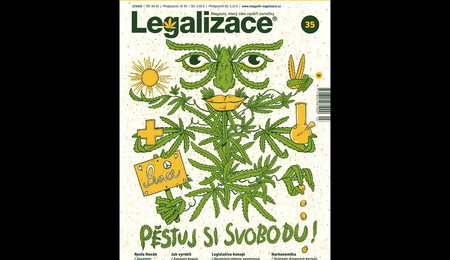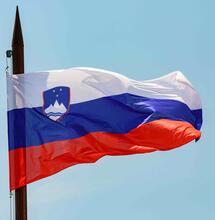Writing about cannabis is a crime in Czechia!

Wednesday November 3rd 2021 will be remembered as a dark day not only in the history of cannabis activism, but also, without exaggeration, in the history of freedom of speech in the Czech Republic. Robert Veverka, the publisher of Czech magazine Legalizace, was given a suspended sentence, and his company Legal Publishing, Ltd. fined CZK 50,000 for spreading the so-called toxicomania. He and his company were supposed to have committed this crime by publishing the magazine.
District judge Marek Stach justified his verdict on following grounds: Some articles published in the magazine may make certain persons want to acquire equipment that would enable them to grow, harvest, process and use cannabis in a way that is not legal. He also stated that if the photographs inside the magazine show flowers clearly covered in resin, there is 100% certainty it is cannabis with psychoactive effects, not legal hemp.
According to the judge, such content is tempting readers; almost every issue of the magazine is allegedly capable of influencing the behaviour of readers and encouraging them to abuse forbidden substances. Although the vast majority of articles in the magazine are in no violation of law, according to the judge even one article capable of incitement is enough for magazine Legalizace to fulfil the conditions for committing the ideological crime of spreading toxicomania.
The investigation of the magazine started after the police arrested an illegal cannabis grower. This accused citizen allegedly claimed that he had obtained the seeds directly in the magazine Legalizace, where he had also read about cannabis cultivation. I, personally, do not know any details about the extent of this person's cultivation, but if he actually got the seeds from the magazine, it was most likely a small-scale grower. The gifts are pretty common in the magazine Legalizace and, in case of seeds, there is always only one seed per issue.
The verdict is absolutely unprecedented, and the whole point of the trial seems to be to show us that the justice can criminalize anyone who publishes any articles or other printed materials on the subject of cannabis. Perhaps the judge would prefer if nobody would even dare say the word “cannabis”. The whole trial at the district court ended very quickly, apparently without taking into account the opinions of experts on the matter – as we can clearly see from the reasoning of the judge. If he claims to be able to evaluate the THC content in buds from the photograph, he is either extremely gifted in the field of spectroscopy or is unwilling to dive into the issue deep enough to check what the science has to say in regard to such claims.
The absence of basic knowledge suggests a deep stigma against anyone even interested in cannabis, let alone those who grow or use the plant. I assume the judge considers such people to be disgusting junkies who can’t lead normal life in society. It is hard to understand such approach, especially when cannabis is experiencing a huge medical resurgence, and many Western countries are significantly changing their attitudes towards the dangers of recreational cannabis use – particularly when compared to alcohol and other addictive substances.
The same article on the spreading of toxicomania was used in the Czech Republic in 2013 when police raided dozens of the so-called growshops all around the country. This raid and following prosecutions resulted in dozens of suspended sentences for shop owners. Prosecutors and judges concluded that if one shop sells “under one roof” growing supplies, cannabis seeds, printed materials containing information about cannabis cultivation, and the proprieties to use the plant, it constitutes the so-called closed chain that can lead to nothing less than illegal cannabis cultivation. This intervention led to the separation of the shops selling growing equipment and shops selling seeds, thus breaking the chain. However, many of these shops have decided to close down and their owners have lost goods and money, notwithstanding the fact that the governments have benefited from their business for many years through VAT, employee levies and other taxes. Robert Veverka and his magazine Legalizace find themselves in a similar situation today.
Magazine Legalizace has been published bimonthly in the Czech Republic since 2010. It offers its readers a wide range of articles not only about things related to cannabis. In the past, the magazine has published interviews with Jakub Frydyrch, the head of the National Drug Headquarters, Lenka Bradáčová, the highest public prosecutor in the country, and many other important figures of the Czech cultural and political scene. Commenting on the interviews in the magazine, the judge said that in his opinion these personalities were not familiar enough with the content and focus of the magazine. In the case of the head of the anti-drug police squad or the highest prosecutor, it sounds rather ridiculous, since judge Stach is implying they are not very intelligent.
.jpg)
People who read magazine Legalizace have learned a lot about cannabis over the course of eleven years, and the information has always been presented in an extremely objective manner. Although the magazine is read mainly by cannabis and legalization enthusiasts, the list of topics also includes descriptions of the risks associated with cannabis use, information on court cases related to the plant and advice for those who have legal issues because of cannabis. A significant portion of the content is also devoted to medical cannabis, scientific developments, and patient stories. Poetry, art, culture and a selection of interesting cannabis related news from all corners of the world can be also found in each issue.
These topics and interviews are considered harmless by the judge. However, he does not agree with articles about cannabis cultivation or reviews of vaporizers, while also opposing the presence of advertisements promoting the sale of cannabis seeds or cultivation equipment. And that is the reason why he assumes that the complete set of topics and their presentation in the magazine is illegal, notwithstanding the fact that the magazine has published dozens of articles related to the medicinal use of cannabis, which is completely legal in the Czech Republic, and has long cooperated with a number of NGO’s: e.g. with the association of cannabis patients called KOPAC. The magazine also provides free advice to all those interested in cannabis treatment, including the elderly. Many Czech experts in drug policies and addiction acknowledge the educational contribution of Legalization magazine in terms of prevention and harm reduction.
The ruling goes completely against the current legislative developments in the Czech Republic because, starting 1st January 2022, we will be one of the few countries where it is legal to grow, process and trade cannabis containing up to one percent of psychoactive THC. It should be noted, though, that the trial is not over yet and Robert Veverka is most likely to appeal and fight in higher courts by all available legal means. If unsuccessful, the magazine Legalizace as we know it would be forced to cease its activities and with it, quite likely, all other media dealing with cannabis issues. I believe that this will not be the case. As Robert’s current motto says: Education is not a crime!



